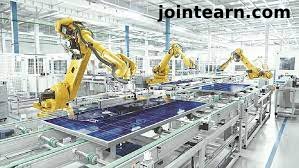India is finalizing a $1 billion capital subsidy to strengthen its solar manufacturing industry, aiming to reduce reliance on Chinese imports and capitalize on the global clean energy transition, according to sources familiar with the matter.
Strengthening Domestic Solar Manufacturing
The Ministry of New and Renewable Energy is leading the proposal, which focuses on domestic wafer and ingot production, one of the weakest links in India’s solar supply chain. Currently, India’s solar wafer and ingot capacity is just 2 gigawatts, primarily built by Adani Enterprises Ltd., compared to 71 GW in solar module capacity and 11 GW in solar cell production, according to BloombergNEF.
The initiative has gained support from Prime Minister Narendra Modi’s office and is expected to be reviewed by the Union Cabinet in the coming months, sources said.
Government’s Push for Solar Self-Reliance
A spokesperson from the Ministry of New and Renewable Energy confirmed that discussions are ongoing to develop incentives for ingots, wafers, and polysilicon manufacturing, but no final proposal has been approved yet.
India remains highly dependent on China for key solar components, posing a risk to energy security. While India has expanded solar module and cell production, it still imports wafers and ingots, crucial components in the photovoltaic (PV) manufacturing process.
Learning from India’s Smartphone Manufacturing Success
The subsidy aims to replicate the success of India’s mobile phone manufacturing industry, which flourished under Modi’s Production Linked Incentive (PLI) scheme. Incentives have attracted global giants like Apple and Samsung, boosting India’s smartphone exports. Similarly, subsidies in the solar sector will help offset high logistics costs and enhance quality control in wafer and ingot production.
The Challenge of Polysilicon Dependency
Even with increased wafer and ingot production, India will still depend on imports for polysilicon, the raw material used in solar manufacturing. Currently, China dominates global polysilicon production with 2.3 million tons annually, while Germany, the second-largest producer, has only 75,000 tons of capacity. India has no domestic polysilicon production at present.
The proposed subsidy program is a crucial step in boosting India’s solar supply chain, reducing dependency on China, and positioning the country as a global leader in renewable energy manufacturing.












